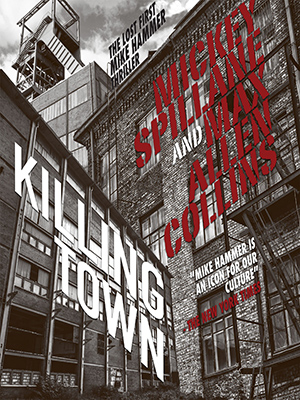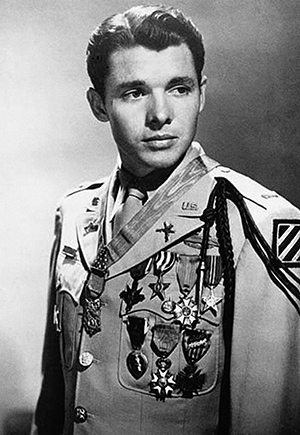
Killing Town, the “lost” first Mike Hammer novel, is now available on audio read by the great Dan John Miller. Read about it here. If you support this audio (and the previous Journalstone Mike Hammer release, The Will to Kill), more will follow!
I am writing this week’s update on Memorial Day Weekend. It seems like a good time to say a few things about Audie Murphy.
First, let me share with you a part of my prep for writing the Caleb York novels for Kensington (under the Spillane & Collins byline) – essentially, how I get into the mood.
I am about to start the new Caleb, Last Stage to Hell Junction. Whenever I do a York novel, Barb and I have an appropriate western film festival, watching an “oater” each evening. For the first novel, The Legend of Caleb York (from Mickey’s screenplay, which started it all), we watched John Wayne westerns, as Mickey had written the screenplay for Wayne’s Batjac productions, though it had never been produced. My favorites, predictably, are The Searchers, Red River and Rio Bravo.
For The Big Showdown, we watched Randolph Scott, including all of his outstanding Budd Boetticher-directed westerns. For The Bloody Spur, our nightly western was a Joel McRae. And I have been gathering Audie Murphy’s westerns (and his other films) for several years now, with an eye on the festival Barb and I are beginning now.

Audie Murphy, of course, is celebrated as the most decorated American combat soldier of World War II. He received every military combat award, including the Medal of Honor, having – at age 19 – held off by himself an entire company of German soldiers for an hour, then (while wounded) leading a successful counterattack.
Murphy was a Texas boy from sharecropper stock who learned his skills with a rifle by putting food on the table for his six brothers and four sisters, after their father left their mother, who died when Audie was a teen. Murphy lied about his age to get into the U.S. Army, not long after Pearl Harbor (the Marines and Navy having turned him down).
After the war, making the cover of LIFE Magazine for his courageous service, he was taken under the wing of the great James Cagney. From the late forties until his tragic young death in 1971, Murphy was a movie star. Aside from a few A-pictures (like The Red Badge of Courage and The Unforgiven, both directed by John Huston), and several contemporary offerings, Murphy specialized in westerns, as well as a western TV series, Whispering Smith.
But his biggest success was starring as himself (a role he reluctantly accepted) in the film version of his autobiographical war account, To Hell and Back. He was a skilled horseman and a successful songwriter, his work recorded by such stars as Dean Martin, Harry Nillson, Eddy Arnold and Jimmy Dean, among many others. And, not surprisingly, he suffered from what we now call Post Traumatic Stress Disorder. He slept with a .45 automatic under his pillow.
Stopped for speeding, Murphy pulled over and, when the officer noticed the .45 on the seat next to the easily recognizable Audie, the cop smiled and said he was a big fan and wanted an autograph. Murphy provided it. Accosted by a gangster at a horserace, Murphy stared him down and said, “I killed sixty of you bums in Sicily – one more won’t make a difference.” The thug moved on. Many a brawny challenger who figured he’d pick a fight with Murphy was quickly and brutally dispatched by the five-foot-five war hero turned movie star.
Or so go the stories. More easily verified is Murphy’s refusal to do ads for cigarettes or liquor, not wanting to set a bad example for young people. He died in a small plane crash.
My character, Quarry, was in part inspired by Murphy. David Morell told me Rambo had the same source. And Robert Stack said his Ness portrayl was inspired by Murphy.
Around Memorial Day, and all year frankly, Audie’s grave at Arlington National Cemetery is among the most visited. He is probably remembered more for his incredible valor as a teenaged war hero than for his movie career, and while that’s understandable, I’m here to tell you he was a fine actor.
In his day – and still today – his ability to star in a film is perceived as a sort of “talking dog” thing – the dog doesn’t haven’t to say anything impressive to qualify for that distinction. My feeling is the studios (chiefly Universal) often felt they had to pair Murphy with a strong character actor – Walter Matthau, Dean Jagger, Barry Sullivan – to carry him.
But anyone at all savvy about film and film-acting can look at Murphy in almost any of his pictures and see how his instinctive, charismatic under-playing seems modern and real while many of the actors around him appear to be shouting and hamming it up. He is present in every scene, quietly reacting, watching, then delivering lines naturally and effectively.
And in scenes of violence, just who this baby-faced boy/man is always comes to the fore. He’s a killer. Real deal. Not a murderer, but a soldier who unflinchingly does what he has to. But he’s not one note: he can be boyish, he can be scary, he can be romantic, he can be funny, he can be tough as hell – as much as I like Randolph Scott (and that’s a lot), Murphy has far more colors to his palette.
We’ve been watching him for a week or so now, and not all of the movies are good – toward the mid-1960s (particularly when he’s not working at Universal), his films are programmers, bottom-bill fodder for drive-ins. But he made some fine westerns, too, and worked with such great genre directors as Don Siegel, Budd Boetticher and Jack Arnold.
My favorite, the latter director’s work, is No Name on the Bullet. Murphy is an assassin who comes to a small western town, quietly checks in at the hotel and minds his own business – only his business is killing someone while he’s in town…but who. Everyone in the community seems to have a secret worth killing for. It’s a very Quarry-like role. The quiet killer side of him is in evidence – the film is thoughtful, a sort of High Noon turned inside out, and Murphy is great. Just great.
In collecting Murphy’s films, I’ve had to order DVDs and Blu-rays from all over the world. A few are available here (including No Name on the Bullet), and there’s a nice boxed set from Turner Classic Movies – check it out.
Oddly, Murphy is considered a major star in Germany. Think about that – our decorated hero is revered by the losers, and patronized and even ignored by the winners. This is much odder than Jerry Lewis being lionized in France (though the French are right about Lewis, and they like Murphy, too, for that matter).
Salute this Texas sharecropper’s son, while Memorial Day is still in the air, won’t you? For his service to his country, by all means. But track down some of his movies. He was a real movie star, and – unlikely as it seems – a fine actor.
The forthcoming Scarface and the Untouchable is one of the ten summer books Chicago Magazine recommends.
Here’s a fine review of Killing Town.
Check out this advance look at the first issue of the Hammer four-issue comic book mini-series.
The Quarry TV series gets some love here.
Finally, here is a wonderful review of Antiques Wanted by a reviewer who really gets what Barb and I are up to.
M.A.C.
Tags: Antiques Wanted, Barbara Allan, Caleb York, Killing Town, Last Stage to Hell Junction, Mickey Spillane, Mike Hammer, New Releases, Quarry, Quarry TV, Reviews, Scarface and the Untouchable, Spillane, The Big Showdown, The Legend of Caleb York, The Will to Kill, Trash 'n' Treasures
Back in my pistol competition days I heard the story of some shooter who considered himself to be extremely fast with a six-gun challenging Murphy to a quick draw duel. Murphy’s response was “Sure, any time you like with live ammunition.”
I love it. And I believe it.
He was said to be the fastest draw in Hollywood, which explains the challenge.
Jerry Lewis and Sammy Davis Jr. were also quite fast. Sammy used to incorporate fancy six-gun handling in his stage act wearing two pistols. At one point when he was being threatened for being married to a white woman he kept one of them loaded with live rounds.
If memory serves me correctly, you can see some of his stuff in the Rat Pack movie ROBIN AND THE SEVEN HOODS.
Also, I just finished re-reading FLYING BLIND. A great piece of story telling.
The first Audie Murphy movie I ever saw was The Texican, a movie I still enjoy, even if it does have his flaws. Right after I saw Arizona Raiders with buster Crabbe making an appearance.
Recently, I watched Trunk to Cairo, a Eurospy movie with Murphy. I thought it was better than a lot of its contemporaries.
Thanks for the kind words about FLYING BLIND, Thomas — one of my favorites of the novels, though truth be told I like them all.
Glen, I have been looking for TRUNK TO CAIRO for years, and your post here inspired me to try harder. Found it in Australia and it’s on the way!
Stateside, Murphy had developed a “crazed look” in his eyes which also discouraged barroom punks. Editors of his films had to be alert to cut it out. Don Siegel toyed with making him Scorpio in Dirty Harry. I always thought Siegel would’ve made him Harry’s “pod double” ala Invasion of The Body Snatchers…
I saw that link to the ANTIQUES WANTED review and thought oh, he finally saw mine! Not the case, but that’s a great review of a very cozy and enjoyable book.
I gave the first 2 to my mother for Mother’s Day and she loves them.
That’s a great point about Germany loving Audie Murphy – I hadn’t previously considered how odd that is. NO NAME ON THE BULLET sounds fantastic.
Bryan, send me a link to your review! macphilms@hotmail.com
NO NAME ON THE BULLET is one of my ten favorite westerns. I’ll do a list one of these days.
The “crazed look,” Bill, makes me wonder — was it developed by Audie as a deterrent? Or did it just…develop?
My late husband and I loved all of Audie Murphy’s movies. He was a true hero and should never be forgotten for his service during WWII. Thanks for the article. It was a great piece.
I’m sure that “look” developed. Doubt he was aware of it. His most sympathetic director may have been John Huston – who did a documentary on returning vets and PTSD.
I always pictured The Road to Purgatory Michael O’Sullivan as played by Audie Murphy.
I also have done an Audie Murphy film study. I tried to buy as many of his films as I could find. Back in the day my younger brother and I would go to all of his movies.